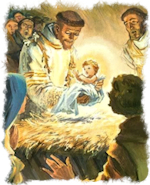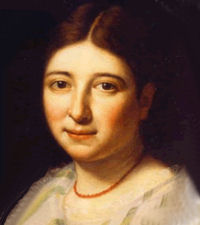Christmas: January 9th
Thursday of Christmas Time after Epiphany
Other Commemorations: Bl. Pauline-Marie Jaricot (RM)
» Enjoy our Liturgical Seasons series of e-books!
We continue our celebration of the Christmas season, with the Church focusing on the aspects of Epiphany.
The Roman Martyrology commemorates Blessed Pauline-Marie Jaricot (1799-1862). In 1818 a young French lay woman, Pauline Marie Jaricot, founded the Association for the Propagation of the Faith, officially recognized on May 3, 1822. Pauline is "the foundress of the largest aid agency for the missions in the entire history of the Catholic Church," which later became the Society for the Propagation of the Faith and was conferred the title "Pontifical" by Pius XI in 1922 (Vatican website). She also was the foundress of the Association of the Living Rosary. She died on January 9, 1862 and was declared venerable on February 25, 1963 and beatified on May 22, 2022.
Christmas Weekday—Day Sixteen St. Francis initiated the beautiful practice of displaying a Christmas crib or creche. He built it in a cave on a bleak mountain near the village of Greccio. News of what he was doing spread all over the countryside and a steady stream of men, women and chldren came by night carrying torches and candles to light their way.
St. Francis initiated the beautiful practice of displaying a Christmas crib or creche. He built it in a cave on a bleak mountain near the village of Greccio. News of what he was doing spread all over the countryside and a steady stream of men, women and chldren came by night carrying torches and candles to light their way.
"It seemed like midday," wrote someone who was there, "during that midnight filled with gladness for man and beast, and the crowds drawing near, so happy to be present for the renewal of the eternal mystery." Francis himself sang the Gospel story in a voice which was "strong and sweet and clear," says the observer. "Then he preached to the people, most movingly, about the birth of the poor King in little Bethlehem." —Excerpted from Christmas
- Day Sixteen activity (St. Francis and the Creche)
- Day Sixteen recipe (Double Chocolate Mocha Biscotti)
Epiphany Reflection: "We have seen His Star"
1. Today by means of the sacred liturgy we relive the manifestation of Christ to the Gentiles at Bethlehem. "When Jesus was born in Bethlehem of Juda, in the days of King Herod, behold there came wise men from the East to Jerusalem, saying:
Where is He that is born King of the Jews?... The chief priests and the scribes of the people...said to them: In Bethlehem of Juda; for so it is written by the Prophet....Having heard the king, [the wise men] went their way….And entering into the house, they found the child with Mary, His mother, and falling down they adored Him" (Gospel).
2. In the wise men who were summoned to the crib of Christ, we are to see the peoples of all past, present, and future generations; but more especially we are to see ourselves. It is we who have been enlightened and aroused by the grace of God to go in search of Christ. Our holy faith is the guiding star which leads through the darkness and the troubles of our earthly sojourn so that the wickedness of Herod can neither misdirect us nor terrify us. Our faith is an unmerited grace. "You have not chosen Me; but I have chosen you" (John 15:16). Grace has led us to Him; grace has further revealed Him in the Gospel, in His Church, in the holy sacraments, and particularly in the Holy Eucharist. We are ever conscious of His living presence and His ever-present guidance. By means of grace we discover Him each day more perfectly within ourselves, operating in us as a vine operates in its branches, or as the head operates in its members, animating them with its own vigor and life. Yet a little while and this star will lead us to a place where we shall find Him with His mother, siting upon the throne of His majesty, at the right hand of the Father. "The Lord hath appeared to us, come let us adore Him." How glorious will be that day when we shall be allowed to gaze upon His majesty, without reservation, with complete security, and for all eternity! This will be the true epiphany, and the consummation of our Christmas.
We rejoice with all our hearts at the glorious destiny that is ours. We greet the star of faith with hearts full of confidence, and we follow faithfully its light and its guidance. We rejoice in our holy baptism, by means of which we were first united to Christ. We exult in our holy Church, which is the house in which we "found the child with Mary, His mother." With the wise men of the East let us lay aside those comforts which the earth could offer us, and turn resolutely aside from all that might detain us in our search for Christ, and hasten to meet Him that we may lay our gifts at His feet. The gifts which we bring are the gold of our faith and devotion, the incense of our veneration and adoration, the myrrh of our willingness to accept all manner of discomfort, sacrifice, labor, suffering, crosses, and humiliations for His sake.
3. "We have seen His star in the east and are come to adore Him." He unites the human nature and the divine nature in one person, and, "as the Father hath life in Himself, so He hath given to the Son also to have life in Himself" (John 5:26). One and the same life is possessed by the Father and by the humanity of Christ. In the child to whom the star has guided us there resides "all the fullness of the Godhead corporeally" (Col. 2:9).
This fullness of divine life which is possessed by the child in the manger is to be communicated to us and to all men upon the earth. The sonship of God, which is His by nature, He is to extend to us by means of grace, so that Christ, according to the divine plan, is to be "the first-born amongst many brethren" (Rom. 8:29). As He is the Son of God by nature, so we become the sons of God by grace. This sonship we receive from Christ. Through Him and through Him alone can we receive grace and eternal life. To be a Christian means to share the sonship of God with Christ, the Son of the eternal Father, to whom we are united as members of a body are united to their head. Only those who possess Christ, only those who come to Him, can share in the life of the children of God, in the grace of God, and in the enjoyment of eternal life. It is the star of faith that has led us to Christ. We have found Him, not by any effort of our own nor because we were more worthy than others, but because of a gratuitous grace of the infinite mercy of God the gift of faith was imparted to us. For this tremendous gift we are thankful, for "by the grace of God I am what I am" (I Cor. 15:10).
How rich we are in the possession of Christ, who has appeared to us! "That Thou wouldst recall to the unity of the faith all those who are in error, and bring all unbelievers to the light of the gospel: We beseech Thee hear us" (Litany of the Saints).
—Excerpted from The Light of the World, Volume One by Benedict Baur, O.S.B.
Blessed Pauline-Marie Jaricot
Pauline Marie Jaricot was born to a very pious Catholic family in Lyons, France, July 22, 1799, and grew up dreaming of becoming a great missionary. Through her brother she developed a real concern for the Asian missions, and at age 17, she began to lead a life of unusual abnegation and self-sacrifice, and on Christmas Day, 1816, took a vow of perpetual virginity. At age 18, she composed a treatise on the Infinite Love of the Divine Eucharist.
In order to repair the sins of neglect and ingratitude committed against the Sacred Heart of Jesus, she established a union of prayer among pious servant girls, the members of which were known as the "Réparatrices du Sacré-Coeur de Jésus-Christ."
During an extended visit to her married sister at Saint-Vallier (Drôme), she succeeded in effecting a complete transformation in the licentious lives of the numerous girls employed by her brother-in-law. It was among them and the "Réparatrices" that she first solicited offerings for the foreign missions. Her systematic organization of such collections dates back to 1819 when she asked each of her intimate friends to act as a promoter by finding ten associates willing to contribute one cent each week to the propagation of the Faith. One out of every ten promoters gathered the collections of their fellow-promoters; through a logical extension of this system, all the offerings were ultimately remitted to one central treasurer. The Society for the Propagation of Faith at its official foundation (3 May 1822) adopted this method, and easily triumphed over the opposition which had sought from the very start to thwart the realization of Pauline Jaricot's plans.
In 1826 she founded the Association of the Living Rosary. The fifteen decades of the Rosary were divided among fifteen associates, each of whom had to recite daily only one determined decade. A second object of the new foundation was the spread of good books and articles of piety. An undertaking of Pauline's in the interest of social reform, though begun with prudence, involved her in considerable financial difficulties and ended in failure. She died on January 9, 1862 and was declared venerable on February 25, 1963. Pope Francis beatified Pauline-Marie on May 22, 2022.
Patronage: Against poverty; impoverishment; poverty.
Highlights and Things to Do:
- Read more about Pauline-Marie Jaricot:
- Visit the website dedicated to Pauline Jaricot.
- Read the Letter written by Pope John Paul II for the bicentenary of the birth of Ven. Pauline-Marie Jaricot.
- Learn more about The Society for the Propagation of the Faith.
- Have your children offer extra prayers for the missions or make a small sacrifice for priests and nuns in mission countries.






